Pagos digitales
La tecnología digital está transformando la manera en que respondemos a las emergencias. Las innovaciones abarcan desde cómo identificar a las personas elegibles para recibir asistencia, hasta la recopilación de datos para evaluaciones y monitoreo, así como la comunicación con las comunidades afectadas por situaciones de crisis. Los sistemas de pago digital, incluidos los dispositivos móviles, cupones electrónicos y tarjetas (cuando se utilizan apropiadamente) pueden proporcionar asistencia más oportuna, más segura, más eficaz en relación al costo, y más inclusiva. Sin embargo, a medida que el volumen de los datos personales que recogemos, almacenamos y compartimos sobre la gente crece, debemos garantizar que nuestros sistemas de protección de datos se mantienen al día, y que comprendemos y mitigamos los riesgos inherentes a las nuevas tecnologías.
Últimos recursos

La asistencia monetaria itinerante “adaptación del programas de asistencia monetaria a migrantes en tránsito”
Informe
En 2019 y 2020, con el apoyo de la Oficina de Asistencia Humanitaria de USAID (anteriormente FFP y OFDA), Save the Children implementó un programa de Transferencias Monetarias Multipropósito con Programación
Complementaria en respuesta al gran número de migrantes venezolanos que ingresaban a Perú.
A...

Digital Currency Governance Consortium White Paper Series
Report
The Digital Currency Governance Consortium (DCGC) convenes more than 85 organizations from the public sector, private sector, civil society and academia to provide a global perspective towards addressing high priority policy and governance issues surrounding new forms of digital currency. DCGC has focused...

The Unblocked Cash Experience in Vanuatu
Case Study
This report provides details of the Vanuatu Business Resilience Council’s (VBRC) role and approach to supporting the businesses in the Oxfam UnBlocked Cash humanitarian programme in 2020-2021 in Vanuatu. While this report documents the learnings using blockchain technology, by sharing the key details...
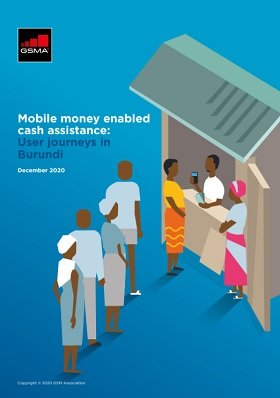
Mobile money enabled cash assistance: User journeys in Burundi
Report
GSMA’s Mobile for Humanitarian Innovation programme teamed up with Ground Truth Solutions to apply a human-centred design approach to understand the user journeys of Concern Worldwide’s cash recipients in Burundi. It provides insights into how humanitarian organisations and mobile money providers can...

Principales Resultados del Estudio de Inclusión Financiera de Refugiados y Migrantes Venezolanos y Población Local en las Ciudades de Lima (Perú), Quito y Guayaquil (Ecuador)
Informe
El Proyecto de Inclusión Económica – EIP es un proyecto financiado por la Agencia de los Estados Unidos para el Desarrollo Internacional – USAID y ejecutado por el Consejo Mundial de Cooperativas de Ahorro y Crédito – WOCCU, el cual tiene como objetivo apoyar a población migrante y refugiada...

Stepping up CVA with COVID-19: Paving the way we respond to future crisis
Report
COVID-19 has thrown the world into lockdown and taken a tremendous toll on the health, social, and economic status of vulnerable communities, households, and individuals. Limitations on daily activities and an over-arching health crisis, restrictions on movement, closures of schools and businesses have...
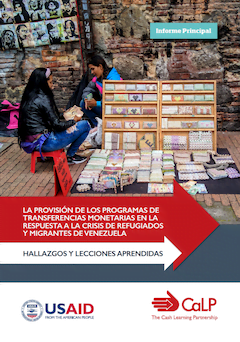
La Provisión de Programas de Transferencias Monetarias en la Respuesta a la Crisis de Refugiados y Migrantes de Venezuela: Hallazgos y Lecciones Aprendidas – Informe principal
Informe
Esta consultoría, para la cual se recopiló información entre marzo y abril de 2020, busca documentar las lecciones y las buenas prácticas sobre la entrega de PTM en Colombia y Ecuador por parte de actores humanitarios y gobiernos, en respuesta a la crisis de refugiados y migrantes de Venezuela. Este...
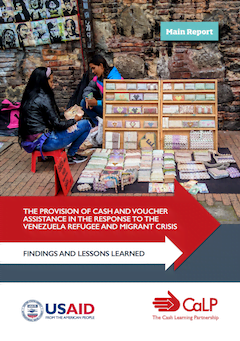
The Provision of Cash and Voucher Assistance in the Response to the Venezuela Refugee and Migrant Crisis: Findings and lessons learned – Main report
Report
This study, for which data was compiled between March and April 2020, seeks to document lessons and good practices in the delivery of CVA in Ecuador and Colombia by humanitarian organisations and governments, in response to migrants and refugees from Venezuela. The purpose of this analysis is...

Sistemización de Buena Práctica – Proyecto: Monederos Electrónicos Ayuda Monetaria en Especie
Informe
La buena práctica que presentamos a continuación se enmarca en el Plan de Respuesta a Refugiados y Migrantes de Venezuela. OIM México es una de las oficinas que implementó este Plan, el cual tiene como objetivo: fortalecer la infraestructura de los gobiernos y la cooperación con la comunidad...

Resumen: Lecciones y recomendaciones sobre el uso de PTM para la temporada de huracanes en el Caribe
Informe
Este es un documento de resumen de la CALP Network Vientos de Cambio: Lecciones y recomendaciones sobre el uso de PTM en el Caribe e incluye una matriz de aprendizaje y evidencia de la región utilizada para informar el informe. Este documento es posible gracias al generoso apoyo del pueblo...
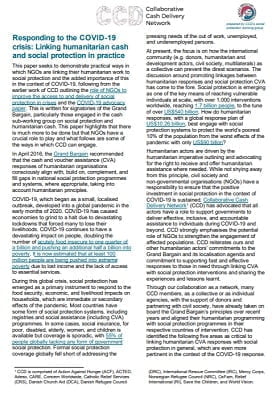
Responding to the COVID-19 Crisis: Linking humanitarian Cash and Social Protection in practise
Report
This paper seeks to demonstrate practical ways in which NGOs are linking their humanitarian work to social protection and the added importance of this in the context of COVID-19, following from the earlier work of CCD outlining the role of NGOs to
improve the access to and delivery of social protection in...

Presentation for the CALP Network’s webinar on remote registration and verification in the COVID-19 response
Presentation
Watch the webinar recording here Speaker presentations from the CALP Network’s 14 July 2020 webinar on: Peril or pitfalls?: Emerging practices on remote registration and verification in the COVID-19 response Remote CVA programming has been highlighted as a key challenge for the community of practice in...

COVID-19: Invest now in cash/voucher-social protection scale-up or children pay the price later
Report
Read the article here. Only socially accountable Social Protection Assistance beyond humanitarian cash/voucher programmes – if properly and quickly implemented – will protect generations of children from the aftershocks of COVID-19. Despite cash and voucher transfers becoming the tool of choice of...

Collaborative Cash Delivery Network – Grand Bargain – Collaboration Agreement Accomplishments 2020
Report
The Collaborative Cash Delivery (CCD) Network is pleased to present its achievements against the commitments made by our global members’ CEOs at the 2019 Grand Bargain Summit as part of our global collaboration agreement. We know we are better together, and in this time of increasing pressure on the...
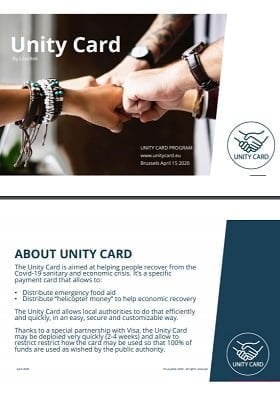
Unity Card
Presentation
In response to NCOVID, we have launched UNITY CARD,
which gives immediate technical support to the deployment of cash aid via this special card payments
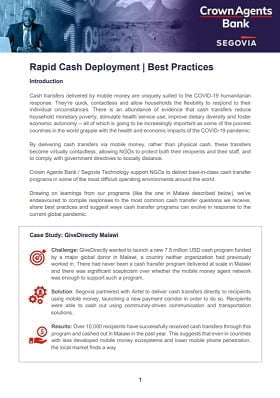
Best Practices for Rapid Cash Deployment
Guidelines and Tools
This note shares some best practices for rapid cash transfers based on our experience delivering cash transfer programs in difficult operating environments. Crown Agents Bank (CAB) and Segovia Technology joined forces last year to seamlessly manage payments to mobile wallets and banks in Africa. CAB has a...

Transferencias electrónicas y dinero a través del teléfono móvil en relación con PTM y COVID-19
Guía y herramientas
El 2 de abril 2020, la CALP Network convocó una reunión con líderes y co-lideres de los grupos de trabajo de programas de transferencias monetarias en relación con COVID-19. Se identificó que las organizaciones utilizan varios mecanismos de entrega de efectivo, entre ellos transferencias...

We Turn Mobile Sim Cards Into Bank Accounts for the Emerging World
Presentation
Fonbnk LLC (“Fonbnk” or the “Company”) is new distributed finance company, providing borderless banking infrastructure directly to unbanked people around the world using the mobile internet. Anyone with a prepaid mobile SIM card and a verified online identity can now have a global stored value...

Webinar | Multi-purpose Cash Transfer and Child Protection: a case study (English and Spanish editions)
Webinar recording
Watch the webinar recording here. More information here. In 2018, with the support of OFDA and FFP, Save the Children implemented a multi-purpose cash transfer ‘Plus’ program in response to the influx of Venezuelan into Colombia. The program aimed at covering vulnerable household’s basic needs and...

CCD Ethiopia one-year in: Collaboration in reality
Report
Based on insights compiled from surveys and interviews conducted with members of the Ethiopian cash community and CCD (Collaborative Cash Delivery Network) members in January 2020, this report provides an overview of how CCD Ethiopia is working towards global and national objectives, takeaways for startup...


